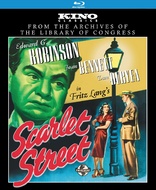Scarlet Street Blu-ray Movie
HomeScarlet Street Blu-ray Movie 
Classics EditionKino Lorber | 1945 | 102 min | Not rated | Feb 28, 2012
Movie rating
8 | / 10 |
Blu-ray rating
| Users | 3.6 | |
| Reviewer | 4.0 | |
| Overall | 3.6 |
Overview
Scarlet Street (1945)
When a man in mid-life crisis befriends a young woman, her venal fiancé persuades her to con him out of some of the fortune she thinks he has.
Starring: Edward G. Robinson, Joan Bennett, Dan Duryea, Margaret Lindsay, Rosalind IvanDirector: Fritz Lang
| Film-Noir | Uncertain |
| Drama | Uncertain |
Specifications
Video
Video codec: MPEG-4 AVC
Video resolution: 1080p
Aspect ratio: 1.36:1
Original aspect ratio: 1.37:1
Audio
English: LPCM 2.0 Mono (48kHz, 24-bit)
BDInfo corrected (dual mono)
Subtitles
None
Discs
25GB Blu-ray Disc
Single disc (1 BD)
Playback
Region free
Review
Rating summary
| Movie | 4.5 | |
| Video | 4.0 | |
| Audio | 3.5 | |
| Extras | 2.0 | |
| Overall | 4.0 |
Scarlet Street Blu-ray Movie Review
Still-shocking noir.
Reviewed by Casey Broadwater February 10, 2012Fritz Lang may not have single-handedly created film noir, but his influence looms large on the genre, which took its earliest
cues from the skewed angles and shadow-filled compositions of the German Expressionist movement of the 1920s and early
'30s, the cinematic school of thought which Lang's silent films--like The Spiders, Dr. Mabuse, the Gambler,
and his sci-fi masterpiece, Metropolis--helped define. It was his first "talkie," however, 1931's M--a
psychological thriller about an ominously whistling child murderer--that would become the clearest prototype for film noir,
wedding a dark criminal story with equally dark and moody cinematography.
With the rise of the Nazi party in Germany, the half-Jewish director fled to Paris, and then Los Angeles, where he joined other
earlier emigres--like F.W. Murnau and Ernst Lubitsch--and began working within a variety of genres inside the Hollywood
studio system. His most lauded films from this period, though, all fall squarely into the nascent film noir category--hardboiled,
cynical and sexual crime stories that take a dim view of human nature. In 1944 and '45, he made two of these back-to-back
with the same cast, The Woman in the Window and Scarlet Street, both concerned with how the most
innocent-seeming characters can be motivated to murder. The latter--and best of the two--was temporarily banned in three
states and deemed by one censor as "licentious, profane, obscure and contrary to the good order of the community." While
it's not quite as uproarious now as it was when it was released, Scarlet Street still has the power to shock.
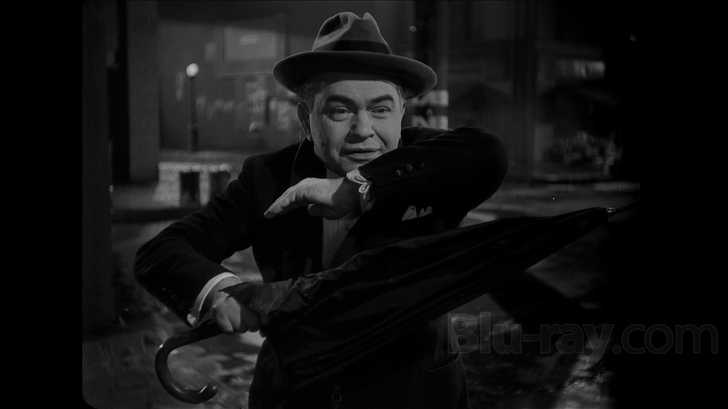
Chris Cross
Edward G. Robinson (Double Indemnity) plays Christopher Cross, an unassertive cashier who seems primed for a mid-life crisis. Trapped in a loveless marriage of convenience to his nagging wife and landlord, Adele (Rosalind Ivan)--who still holds a flame for her presumed-dead former police detective husband--Chris fritters away his Sunday afternoons holed up in their apartment bathroom, making expressionist paintings of flowers and surreal New York City street scenes. He's long-since given up the dream of being a real artist; for the past 25 years he's slaved away exchanging checks for cash at J.J. Hogarth & Company--a job for an ambition-less schmo.
At a dinner party celebrating his quarter century of faithful service, Chris notices that his boss is "stepping out" with a sexy blond and wonders "what it's like, to be loved by a young woman like that." Short and squatty, with a scrunched, troll-like face, he's clearly had little luck with the ladies, but Chris is gentlemanly and sweet--the sort of innocent, luckless character who garners instant sympathy. (If the film were being made today, you might imagine Patton Oswalt in the lead role.) On his way home from the party, he breaks up what he assumes is a mugging, rescuing Katherine "Kitty" March (Joan Bennett) from her attacker, who flees into the night. Chris and Kitty bond over drinks afterward, and they both conceal their true occupations. Bashfully, Chris hints that he's a painter, and Kitty--who assumes Chris is wealthy--tells him that she's an actress. Though it's never outright stated in the film--the Hays production code would've prohibited it--it becomes clear that she's actually a prostitute, and her "attacker" earlier in the evening was her pimp, the smooth-talking grifter Johnny Prince (Dan Duryea). The innuendo gets a bit more obvious when Johnny begins referring his working girl by the languid, whorish nickname "Lazy Legs."
Kitty and Johnny devise a long-con that involves Kitty pretending to fall in love with Chris and gradually siphoning off more and more of his money--cash that he flat-out doesn't have. He may not be rich, but Chris really is an easy mark; the naive and lovelorn would-be artist is a sucker for Kitty's attention, and he begins filching from his wife and eventually even his work in order to set the femme fatale up in a swanky Greenwich Village loft, where he can discretely visit her and work on his paintings. Stretching the grift too far, Johnny tries to sell some of Chris' pieces on the sly, and when a renowned art critic proclaims them to be the work of a genius, Kitty is forced to pretend that she's the real artiste. Of course, Chris will eventually discover the truth--that he's been played, his heartstrings cruelly manipulated--and this leads to a moment of unabashedly brutal ice-pick violence, a crime of passion that will forever haunt him.
The key here is the smart use of dramatic irony. We know the truth about all of the characters, and from the beginning of the second act we can see the path to mutual destruction that they're on together, but the tightly structured story feels more inevitable than predictable. This is the mark of a great tragedy--each of the characters gets exactly what's coming to him/her, but the denouement is still fulfilling and, more so, cathartic. The plot of Scarlet Street is arranged with a precision that perhaps relies too heavily on chance--including the sudden, fortuitous reappearance of Adele's husband, who was thought to be drowned--but this one of the film's precious few structural faults. If you can get past a few improbabilities and convenient coincidences, Scarlet Street is an exemplary noir, throwing morally compromised characters into a dodgy situation and observing how they react. The acting is wonderful. Edward G. Robinson made his mark as a tough-guy gangster in films like Little Caesar and Key Largo, but he shows his versatility here, playing Chris as insecure, uncomfortable, and meek to a fault. Joan Bennett makes for a particularly cruel femme fatale, and Dan Duryea has a corrupted pretty boy swagger that's perfect for the part of a two-bit conman who dreams of Hollywood stardom.
As a film noir title, Scarlet Street is one of the greats--it simultaneously connotes sex and sin, prostitution and bloodshed, without being explicit. And that feeling extends throughout the entire film; at every turn it's suggestive, hinting at inherent elements of the story that would be too risqué to portray outright in the mid-1940s thanks to the prohibitions of the Hays Code. There's barely a kiss here, but Lang switches on a shielded sexual undercurrent that electrifies screenwriter Dudley Nichols' dialogue, especially in the violent, needy relationship between Kitty and her pimp. Nichols based his script on the French novel La Chien (The Bitch), which had previously been adapted by Jean Renoir in 1931, and while both films share a nearly identical plot, Scarlet Street is quite different in tone. Where Renoir's film is more comic and humanistic and c'est la vie--not to mention more sexually frank--Lang's takes on an increasingly more serious, moralistic quality as it nears its conclusion, with the message that even if a criminal isn't caught, his guilty conscience is punishment enough. There's also plenty of room to read the film as a statement about how artistic ambition is squelched by the workaday, cog-in-a-corporate-wheel capitalist routine.
Scarlet Street Blu-ray Movie, Video Quality 
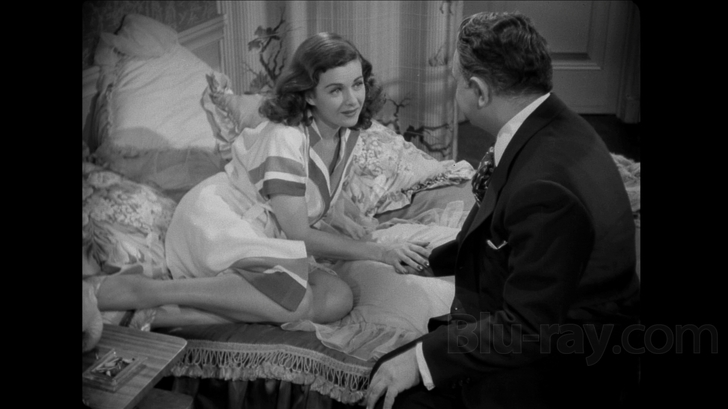
Like all films in the public domain, Scarlet Street has had its share of dubious home video releases. Thankfully, Kino's definitive new Blu-ray edition bests them all, with a 1080p/AVC-encoded transfer sourced from the best 35mm print available-- a copy preserved and restored by the Library of Congress. You'll notice occasional specks and light scratches--as usual, Kino hasn't tried to digitally remove or obscure the age-related wear 'n' tear--but the print is actually in great condition, with no major tears or stains or warpage. Simply transferring the film in high definition puts this releases leagues above previous standard def editions; there's definitely a newfound degree of clarity that's immediately visible in the fine textures of the characters' faces and clothing. The tonal balance of the monochromatic presentation is handled excellently too. Blacks are deep and defining, whites are crisp without looking over-bright, and there's a rich spectrum of grays in between. Grain is perfectly preserved (no DNR here), the sharpness of the image looks natural (no edge enhancement), and there are no real compression concerns. Of course, it would be great if Kino had the resources to do a frame-by-frame clean-up, but I'm more than happy with how the film looks here.
Scarlet Street Blu-ray Movie, Audio Quality 
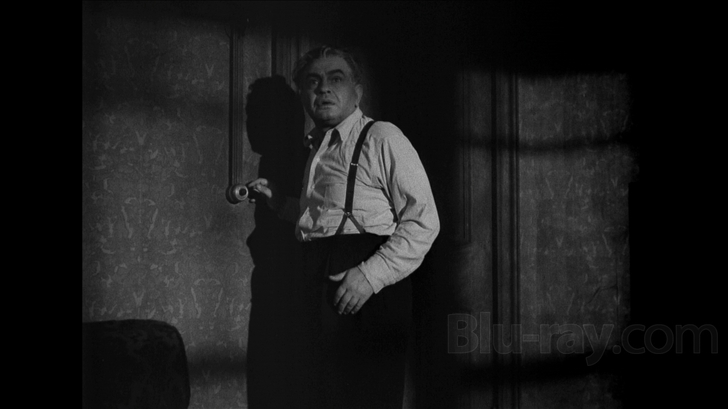
Scarlet Street is presented with its original single-channel audio by way of an uncompressed Linear PCM 2.0 mono mix. In some ways, audio is a bit more difficult to clean up than film, so you will notice a light hiss from time to time, along with intermittent pops and crackles and splices. None of this is distracting in the least, and you regularly watch films from the 1940s and beyond, you already know what to expect. Where it counts--clear dialogue and a mix that's decently full--this track more than suffices. Composer Hans J. Salter provided a minimal score for some scenes, but most of the music in the film is strictly diegetic, like the use of Ernie Burnett's "Melancholy Baby." Regardless, the music sounds good--not brash or tinny or compressed. Although the dialogue is always easy to understand, unfortunately Kino hasn't provided any subtitle options for those who might need or want them.
Scarlet Street Blu-ray Movie, Special Features and Extras 
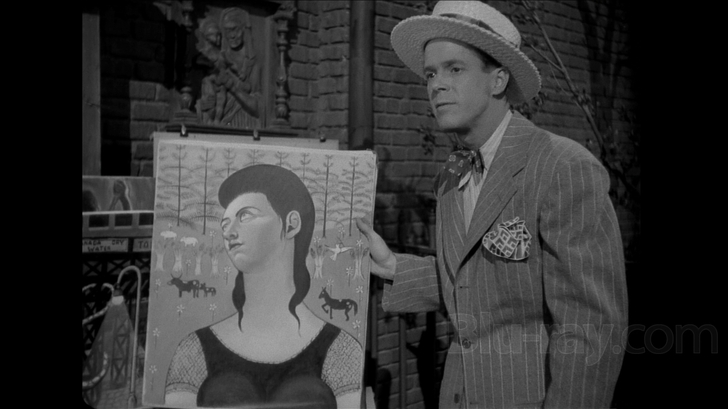
- Audio Commentary: I've listened to a few commentaries by film historian David Kalat, author of The Strange Case of Dr. Mabuse, and they're all very similar--impeccably researched and highly informative, but a bit of a slog to listen to since Kalat's reading voice comes off as a bit too self-satisfied. And he's definitely reading his remarks; this is more of an audio book-style essay than an off-the-cuff discussion. YMMV.
- Gallery (1080p): A user-directed gallery with 16 stills and poster images.
- Kino Classics Trailers (1080p): Includes trailers for A Star is Born, Nothing Sacred, and Pandora and the Flying Dutchman.
Scarlet Street Blu-ray Movie, Overall Score and Recommendation 
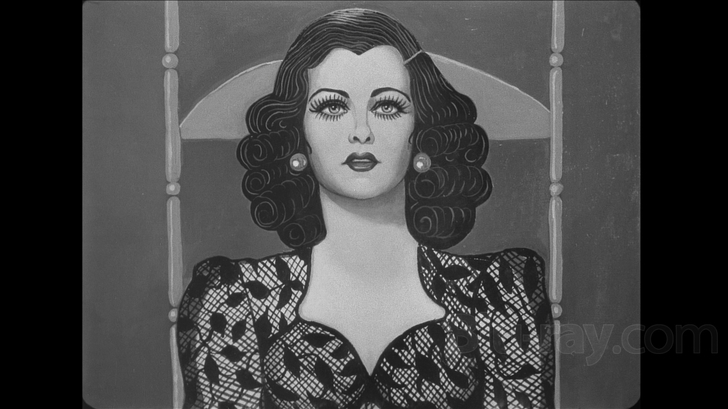
One of Fritz Lang's best American films, Scarlet Street is a satisfying crime drama that charts the moral decline of an initially innocent man. Classic film noir titles are seriously underrepresented on Blu-ray, so it's great that Kino is picking up some of the slack in the big studios' release schedules; here's hoping they can license Woman in the Window or some of the other films from Lang's Hollywood period. As you'd expect from Kino, Scarlet Street looks fantastic on Blu-ray; if you've been collecting the other releases in the "Kino Classics" series, this is another worthy addition. Recommended!
Similar titles
Similar titles you might also like

The Dark Mirror
1946

Out of the Past
Warner Archive Collection
1947

Leave Her to Heaven
1945

Phantom Lady
1944

The Postman Always Rings Twice
1946

Possessed
Warner Archive Collection
1947

On Dangerous Ground
Warner Archive Collection
1951

Murder, My Sweet
Warner Archive Collection
1944

Witness to Murder
1954

Impact
Collector's Edition
1949

Mystery Street
Warner Archive Collection
1950

Too Late for Tears
1949

The Lost Weekend
1945

The Strange Love of Martha Ivers
4K Restoration
1946

Crossfire
Warner Archive Collection
1947

The Strange Affair of Uncle Harry
1945

The File on Thelma Jordon
1950

Private Hell 36
1954

The Glass Key
1942

Whirlpool
Limited Edition to 3000
1950
